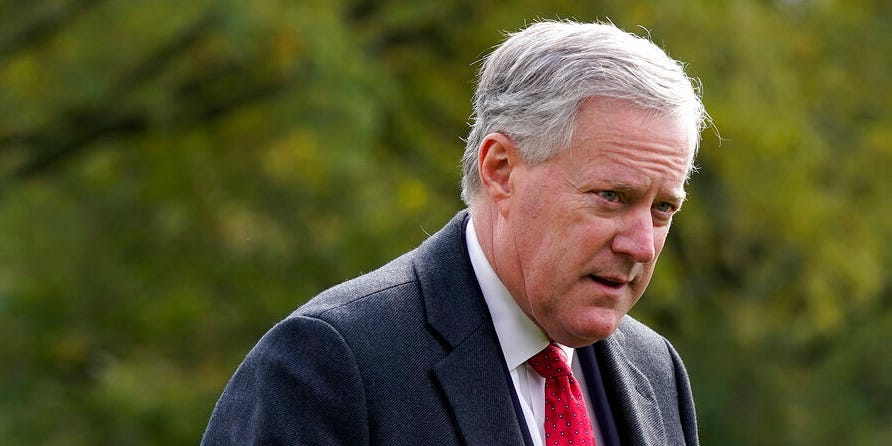
- Former White House chief of staff could face up to a year in prison if convicted of contempt of Congress.
- The House January 6 committee previously voted to hold Steve Bannon in contempt.
- The full House could vote as early as later this week to refer Meadows to DOJ for prosecution.
The House committee investigating the January 6 attack on the Capitol voted unanimously late Monday to hold former White House chief of staff Mark Meadows in contempt over his refusal to answer questions and turn over contested documents as part of the inquiry.
The panel's move sets the stage for the full House to vote on holding Meadows in contempt of Congress and referring him to the Justice Department for criminal prosecution on a charge carrying a punishment of up to a year in prison.
The vote came a day after the House select committee released a report detailing the extent of Meadows' involvement in former President Donald Trump's ill-fated effort to overturn the 2020 election. In a 51-page report, the panel of seven Democrats and two Republicans made its case for holding Meadows in contempt of the legislative body where he served from 2013 to 2020 as a Republican representative for a western North Carolina congressional district.
"Whatever legacy he thought he left in the House, this is his legacy now," said Rep. Bennie Thompson, the Democratic chairman of the House committee, on Monday. "His former colleagues singling him out for criminal prosecution because he wouldn't answer questions about what he knows about a brutal attack on our democracy — that's his legacy."
The committee said in the report that it wanted to question Meadows about an email he'd sent on January 5 advising that the National Guard was present the following day to "protect pro Trump people." The House panel wants to ask Meadows about an exchange he had with an unidentified senator about rejecting the electors for now-President Joe Biden.
In the report, the committee also said Meadows used a personal cell phone, two personal Gmail accounts, and a Signal account for official government business.
Meadows had been cooperating with the House investigation into January 6 but abruptly shifted course last week. Citing Trump's assertion of executive privilege, Meadows declined to turn over additional documents after having provided more than 9,000 pages of records to the House panel, including thousands of text messages, and he declined to sit for a scheduled deposition.
"He changed his mind and told us to pound sand. He didn't even show up," Thompson said.
"He has no credible excuse to stonewall the select committee's investigation," he added.
Following Thompson's remarks, Rep. Liz Cheney read aloud a series of text messages in which Trump allies and Fox News hosts urged Meadows to convince Trump to publicly denounce the January 6 attack as it unfolded at the Capitol. Cheney, the committee's vice-chair and one of two Republicans on the House panel, said the texts leave "no doubt" that the White House was aware of the extent of the violence.
Meadows sued House Speaker Nancy Pelosi and other House lawmakers last week in federal court, where he asked a judge to block a subpoena the January 6 committee issued him along with a separate subpoena to Verizon seeking his phone records.
Ahead of Monday's vote, Meadows' lawyer asked the panel to reconsider its plans to hold Trump's former chief of staff in contempt and instead allow the civil lawsuit to proceed in Washington, DC, federal trial court. The lawyer, George Terwilliger III, said Meadows was trying to comply with his "legal obligations" as a former top Trump advisor.
Legal experts said Meadows' lawsuit and past role as a close Trump advisor could complicate the Justice Department's consideration of bringing contempt charges against him. In November, the Justice Department brought charges against Steve Bannon based on a referral from the House committee investigating January 6. But, unlike Meadows, Bannon was not serving in government during the period in question, undercutting his claims of privilege.
The House committee has also voted to hold the former Justice Department official Jeff Clark in contempt over his refusal to cooperate with the panel's demands. Clark, who helped advance Trump's baseless claims of election fraud, has said he plans to assert his 5th Amendment rights against self-incrimination and was given a second chance to appear before the House January 6 committee. The full House has held off on voting to hold him in contempt ahead of Clark's scheduled appearance before the committee on Thursday.
In the buildup to Monday's vote, the House January 6 committee said Meadows' recently-released book raised a number of additional questions. The book, titled "The Chief's Chief," made his refusal to testify "untenable," the committee said.
"Mr. Meadows has shown his willingness to talk about issues related to the Select Committee's investigation across a variety of media platforms — anywhere, it seems, except to the Select Committee," the panel wrote.
Last week, a three-judge appeals court panel rejected former President Donald Trump's bid to prevent the National Archives from handing records from his administration over to the House committee. In a 68-page opinion, Judge Patricia Millett wrote that Trump had provided "no basis" for the court to reject Biden's decision to allow the release of those records.
Thompson celebrated the ruling on Monday, saying the court ruled "quickly" in the committee's favor.
"Day to day, we are getting a clearer picture of what happened, who was involved, and who paid for it," he said. "So I'm pleased to report we're making considerable progress, and before too long, our findings will be out in the open."
